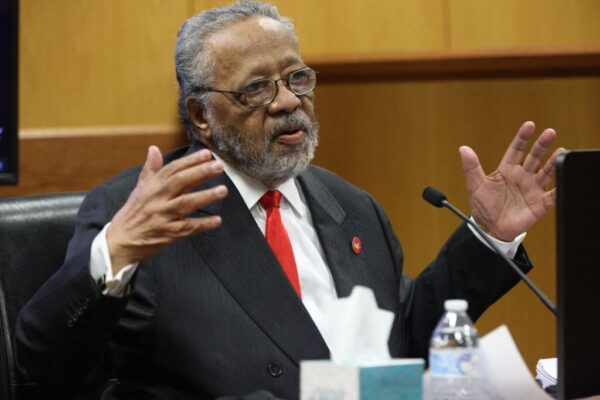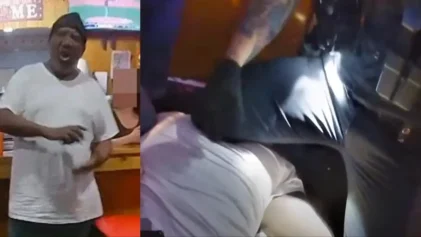On the second day of the evidentiary hearing held to determine whether Fulton County District Attorney Fani Willis should be disqualified from the 2020 election interference case against Donald Trump, her father testified in response to a question about Willis keeping a large amount of money in her home.
An attorney asked John C. Floyd III whether he recalled his daughter stating anything about “having a large savings of cash” when she left the house she owned, video from the testimony shows.

Floyd, a criminal defense lawyer whom Willis testified taught her the importance of having cash available, said to the Fulton County Superior Court Judge Scott McAfee, “Excuse me, Your Honor, I’m not trying to be racist, OK? But it’s a Black thing.”
Floyd explained that he and other Black people are trained to keep cash on hand, a cultural practice that he had passed down to Willis, who said during her time on the stand that he encouraged her to keep six months of cash available, though she said she didn’t always abide by this.
Is Keeping Cash at Home “a Black Thing,” As Floyd Stated In His Testimony?
Last year, rapper and Georgia native Tauheed K. Epps, also known as 2 Chainz, shared on Instagram that he’d discovered a large bag of rolled-up bills that his late father, who died in 2012, had stashed away in their home’s basement, Atlanta Black Star previously reported.
The cultural practice also appeared in the 1997 comedy-drama “Soul Food,” starring Vivica A. Fox and Vanessa Williams, where the family is aware of a rumor that their matriarch, Big Mama, had a big pile of cash stored somewhere in her home. The rumor turns out to be true, according to the plot.
Black culture experts agree that the practice has been common in Black households based on anecdotal information, as there are no studies that measure just how prevalent the practice is among the Black community.
“I know from my experience, my father, who’s 84, never got an ATM card in his life, [he] kept cash in his bedroom,” Dr. David Canton, director of the African American Studies Program and an associate professor of history at the University of Florida, told Atlanta Black Star.
“When people like to pay in cash, there’s just a stigma,” Canton said. “I think that’s the issue – you have a high-income African-American woman, why is she paying in cash?” referring to Willis and the questions surrounding her cash payments that came up during the hearing.
“There’s always gonna be that side eye, where if you’re a professional paying in cash, people are surprised or shocked rather than just saying, ‘thank you very much,’” he said.
Canton also commented on Floyd’s remarks about having a racist encounter in Cambridge, Massachusetts, during a time he was participating in a Harvard fellowship and Willis was a young child.
Floyd testified last week that a restaurant’s cashier, “for whatever reasons,” wouldn’t accept his credit cards or traveler’s checks, so he covered the check with a $10 bill he had on him.
“It’s, I guess, the ‘what if’ reality, [where] you’re prepared by having cash,” Canton said.
He said for Black middle-class people entering white-dominated spaces during the 1960s and 1970s, having cash on hand offered a sense of protection.
“Let’s say for instance, you’re driving on the road, pulled over by police and need to pay bail, you have cash,” Canton said.
“In the late ’60s, early ’70s, that generation started breaking barriers, [so they wanted] to have cash to protect [themselves], and they passed it along to their children,” he said.
“Even though it’s 2024, for most people, racism still exists, so to be on the safe side, have some cash because you never know,” he explained.
Some people may hesitate to place trust in financial systems, according to Canton, who referenced the shutdown of banks during the Great Depression and financial concerns during the 2008 recession.
“If God forbid, the computer systems crash, your cards don’t work, I could see people having that, ‘what if that happens?’ What if you couldn’t use your debit card? How are you going to feed your kids? What if there was a glitch in the system?” Canton said.
“It’s never happened, but that could happen because systems sometimes don’t function,” he added.
The Urban Institute says some Black people’s reluctance to engage with banks could stem from the fact that the banking system in the United States, which started during a time when slavery was still a legal practice, intentionally excluded Black people for a century.
Discriminatory practices, including subprime lending and redlining that followed, according to the Urban Institute, may have also contributed to that mistrust.
Dr. D’Andra Orey, a political science professor at Jackson State University, said Black elders would store their money under mattresses. Sometimes, he said, they lived paycheck to paycheck and did not have much to store, but what they did have, they allowed to accumulate at home.
“For whatever reason, they don’t have banking or banking accounts because they don’t have the credentials to get accounts,” said Orey, who added that some Black people do choose to diversify their assets.
“Having some money in the bank, some money in the market, some money at home, and I believe that that’s traditional and cultural,” Orey told Atlanta Black Star.
The lack of trust in the banking system that Canton discussed could also have to do with the rise in scams and stolen identities, according to Orey.
“There’s a lack of trust in some respects; you can go back, for example, to Black Wall Street,” Orey said. “A lot of folks had their money invested in banks or saved in banks, and they burned down their entire business district.”
He noted that while there is evidence that storing cash at home is a Black cultural practice, it’s also a good practice in general.
“Having six months’ salary or six months’ income stored away is combining both cultural tradition with economic good practices,” Orey said.


